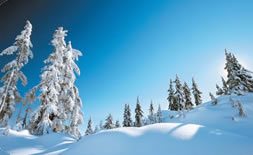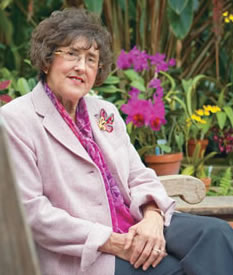Nature's Medicine

Spending time in nature may improve memory and concentration among cancer patients
We tend to underestimate winter's beauty. The days are cold and short -- and all too often dreary But every now and then it startles us: The sparkle of an icicle compels our attention. We "ooh" and "ahh" when snow dusts tree boughs like powdered sugar. And even if we dread the shoveling, we still pause to admire the way snow blankets imperfections before we dig in and muddy up the path.

View a more comprehensive list of Tips on Getting a Daily Dose of Nature
With so many things competing for attention in our lives -- particularly for those who have been diagnosed with cancer -- it can be easy not to hear the snow crunching under our boots. But a growing body of research suggests that our lives might actually be better if we did. Bernadine Cimprich, Ph.D., R.N., an associate professor of nursing at the University of Michigan Rogel Cancer Center, has conducted studies that have shown that breast cancer patients who made a point of spending time in nature were better able to concentrate and had fewer problems with memory than those who did not spend time in nature.
"The women showed signs of having problems concentrating before any chemotherapy. The thought is that it's related to fatigue and stress and that possibly when a woman gets chemotherapy, that's compounded, but we don't know that yet," Cimprich said. "In any case, the women who spent time in nature showed improvement in cognitive functioning and maintained it over the course of the year that we followed them."
Other studies have shown similar effects in the general population as well. Caregivers, in particular, may benefit from nature activities. Cimprich recommends spending at least 20 minutes in nature per day, or about two hours per week. Patients and caregivers should choose nature activities that appeal to their interests.
"Some people like to do gardening," she said. "And some people just like to watch the garden grow."
Tips to get you started including nature in your life
Tip 1:
Look at nature pictures or videos. Flip through the latest National Geographic or consider a DVD such as the Discovery Channel's Planet Earth.
Tip 2:
Visit the U-M Matthaei Botanical Garden. The indoor conservatory will transport you to warmer climes -- and it's just minutes from the Rogel Cancer Center, at 1800 Dixboro Road in Ann Arbor. Or, explore a nature preserve closer to your home.
Tip 3:
Grow an indoor garden. Use common containers like clean milk jugs, cans and jars filled with water to sprout sweet potatoes, carrots or avocado seeds. Grapefruit, lemon and orange seeds planted in potting soil or vermiculite grow into pretty plants. Make a window herb garden; dry the herbs you don't cook. However, if you are currently receiving cancer treatment, check with your doctor first. Exposure to live plants and soil may not be advisable for some patients.
We've put together a list of ideas to help you get the most out of nature during a cold Michigan winter.

Make a cozy nook by a window.
Watch the snow fall and the weather change from the warmth of your home.

Invest in a fish aquarium.
Watching fish swim is soothing -- and fascinating.

Hang a bird feeder . . .
. . . near a window so you can watch from inside on cold days.

Use candles or a fireplace.
Relax while you watch the flames flicker.

Play in the snow.
If you're feeling up to it, take a walk on a snowy day or throw a snowball at a tree.

Visit the zoo.
The aviary and butterfly houses are open year-round.
Keep reading for More Nature Tips
Continue learning how to improve concentration and other techniques to off-set the side effects of cancer treatment
Starts and Stops for the New Year
Continue reading the Winter, 2011 issue of Thrive.
